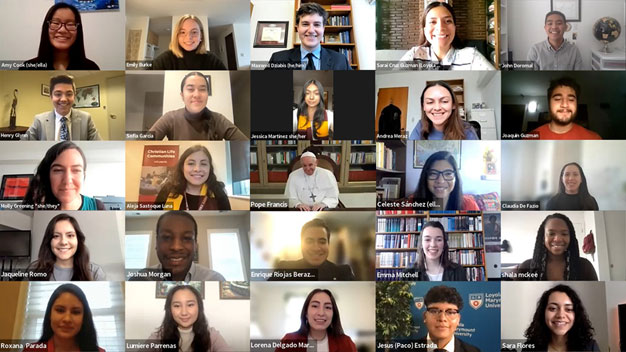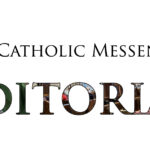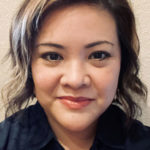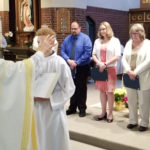
Enrique Riojas Berazaluce of St. John Vianney Parish in Bettendorf, center (fourth row from top) participates in a virtual synodal encounter with Pope Francis, center, earlier this year.
By Anne Marie Amacher
The Catholic Messenger
Enrique Riojas Berazaluce of St. John Vianney Parish in Bettendorf was one of a select number of students from the Americas to participate in a virtual synodal encounter with Pope Francis earlier this year. Five weeks later, he and other college students participated in a follow-up virtual synodal encounter with U.S. bishops, including Bishop Thomas Zinkula.
Loyola University-Chicago, which organized the synodal encounter with Pope Francis, reached out to theology faculty at St. Louis University (SLU), where Riojas Berazaluce is a freshman studying political science and philosophy. SLU invited him to participate. “I could not believe it at first. The event had not been announced publicly, so I had no idea whether it was a real event until later. It seemed too good to be true, frankly.”
Catholic News Service reported that the initiative grew to include 130 students from 58 universities in 21 countries in the Americas that met in work groups. Some of those students met virtually with Pope Francis during the Feb. 24 event titled “Building Bridges: A Synodal Encounter between Pope Francis and University Students.”
Riojas Berazaluce was one of two students from SLU who participated in the encounter, scheduled for one hour, but which lasted almost two hours. “There were people from virtually every country in North and Latin America,” he said. Pope Francis spoke mostly in Spanish, but included some English. He asked the students about their “experiences with climate change, immigration and the Church’s relationship with young people,” Riojas Berazaluce said.
“My delegation specifically talked about what we believe is a deficiency in our bishops’ engagement with “Laudato Si’” (the pope’s encyclical, subtitled “On care for our common home”) as well as how to use Catholic buildings and infrastructure after their original use has ended.” Riojas Berazaluce would have appreciated discussion about how the issues of immigration and climate change play into evangelization, he said. Overall, the encounter “was surreal and a very hopeful experience, one which I will remember for the rest of my days. It was truly a blessing.”
Following the Feb. 24 encounter, Riojas Berazaluce was among 35 young adults who participated in a synodal virtual discussion April 4 with Bishop Zinkula and nine other U.S. bishops. “The USCCB Synod team invited me to participate in this discussion,” Bishop Zinkula said. During the discussion’s breakout session, the bishop talked with Riojas Berazaluce and Henry Glynn, a student at Creighton University and Emily Burke, a Creighton graduate.
“We discussed some of the things that were already being done in the Diocese of Davenport, which I believe is a model for all other dioceses,” Riojas Berazaluce said. “We also shared with him our plan for repurposing Catholic infrastructure when able to and how to become a more outreaching Church. It was great to see Bishop Zinkula and it was an incredibly hopeful experience seeing what is being done in practice.”
He praised Bishop Zinkula and the Davenport Diocese as “models for the rest of the Church in the U.S. I took part in the Vision 20/20 Convocation, which I think was exactly what the Church needs. Bishop Zinkula has also mentioned how Laudato Si’ is being taught in parishes and promoted throughout the diocese. There is also the Gender Committee, which I believe is extremely innovative and helpful. I think that in order to become a more outreaching church, we simply need to show what we are already doing to the world! The Church exists to serve the world, even in its sinfulness.”
Riojas Berazaluce, Glynn and Burke sent a follow-up email to Bishop Zinkula, thanking him for his time. “We would love to continue building a relationship with you and learn more about what your diocese is doing with the synod and Laudato Si’,” Glynn wrote on behalf of his peers.
“Speaking with you about important topics like the intra-Church partisan divide, young peoples’ longing for community, and the future of American Catholicism sparked in our hearts other questions that we would love to speak with you about,” Glynn wrote.
The three met again with Bishop Zinkula, virtually, on April 28. He said they were well prepared and organized. “There were three topics of discussion on their agenda. First, they wanted to revisit a request they made in our first conversation, which was that I consider joining a group of bishops affiliated with the Catholic Climate Covenant. I had already told them ‘yes.’”
“Second, they requested that the diocese consider pursuing a ‘net zero’ pathway — reaching net zero emissions by 2050. They presented a couple of resources for potential conversations on this topic. Third, they mentioned once again the silence of the bishops on climate change, and encouraged (challenged?) me to issue a statement on it or write a column for The Catholic Messenger about it. I was touched and inspired by the passion of these three young people on climate change, which is deeply interconnected with their Catholic faith. They offered to remain in communication with me and to assist the diocese in its efforts related to its Laudato Si Action Platform.”
(Barb Arland-Fye contributed to this story.)











